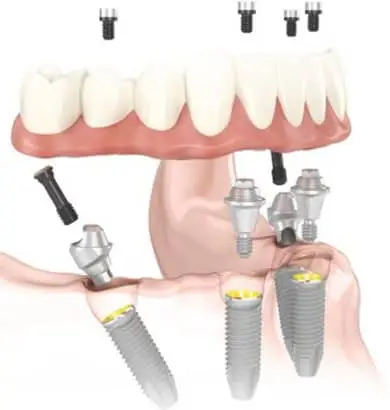About eight years ago, I went and had All-on-4 dental implants done. It was a pretty intensive process and it wasn’t cheap, but my dentist said it would give me the best results and would likely last the rest of my life. A couple of months ago, I started noticing a bad taste in my mouth. Nothing had changed for me. I’m a good brusher and I floss. I use mouthwash to stay fresh as well. I was a little self-conscious about it, worried it also meant I had bad breath too, so I mentioned it to my hygienist at my visit roughly one month ago. The doc was pretty quick to act and did x-rays then and there. He determined that one of my All-on-4 dental implants was infected and put me on antibiotics. However, he also said he was worried that the infection would come back and, if it did, it would mean the implant was a loss—I’d lose my appliance and would have to go through surgery again to redo the one that is being problematic.
The whole thing is a mess and it looks like I’m not only going to have to go through the whole process again, but have to pay for everything all over again. How common is it to have this procedure fail at this point? And, if I go ahead and start over, what’s the likelihood that the new work will fail again? I’m almost at a point where I’m ready to just have them give me a set of regular dentures and leave it at that. I’m 64 years old, if that matters.
Thanks,
Rick
Dear Rick,

All-on-4 dental implants
All-on-4 Dental Implants Have a High Success Rate
So sorry to hear about your challenges. There are a couple of ways to break down the statistics with your all-on-4 dental impalnts. One study involving 245 patients who had 980 implants placed in total followed their success rates for ten years. At the ten-year-mark, only 13 of the 245 patients had their dental work fail, which means people-wise, there’s a 94.7% success rate at ten years. Of the 980 implants placed, a total of 21 failed, resulting in a 97.8% success rate for the individual implants.
Certain Things Can Impact Success Rates
Clearly, the All-on-4 dental implants procedure works well for lots of people, but it doesn’t work well for everyone. A few things that can lead to dental implant failure include:
1. Periodontal Disease
2. Health Conditions (Diabetes, Inflammatory Diseases, etc.)
Smoking
3. A Placement Problem.
After Eight Years, It’s probably not a placement problem
If something was off about the way the procedure was performed or how your body adapted to the treatment, you would have started having issues much sooner. Think in terms of months or maybe a year or so after. Given the length of time that’s passed, something else likely contributed to the infection. If you don’t fit into one of the high-risk groups, it may be impossible to determine what caused the infection or contributed to the failure.
Redoing the Work is a Personal Decision
If a cause can’t be determined and your dentist doesn’t have any insights, it’s really a personal decision whether you want to do the work again. Unfortunately, there aren’t any really good studies that look into longevity after a redo. But, bear in mind, three of the placements are still solid and holding strong, which is a great sign and also means you will pay considerably less for any additional work needed. For added assurance, you may want to visit a specialist, such as a periodontist, to get a second opinion.
Dental Implants are Far Superior to Dentures
Dentures come with a whole other set of problems. They reduce your chewing capacity by at least 50%, even with the best fitting dentures. The worst problem with dentures, however, is facial collapse. Without the dental implants, your body recognizes there aren’t any teeth there and begins to resorb the minerals in your jawbone to use elsewhere in your body. After about ten or so years, you won’t have enough of your jawbone left to even retain your dentures.
This blog is brought to you by Atlanta Periodontist Dr. David Pumphrey.
This blog is sponsored by Atlanta All-on-4 dental implant provider Dr. David Pumphrey.







